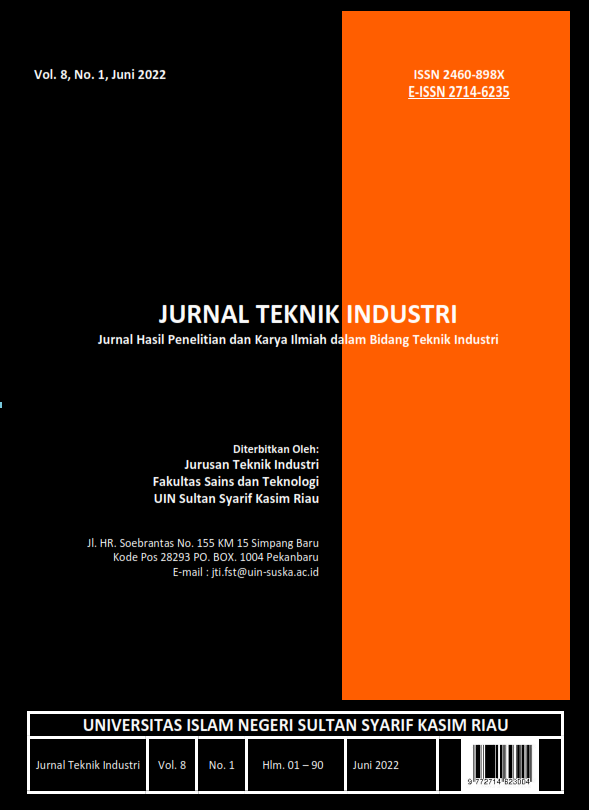Earned Value Method untuk Analisis Pengendalian Jadwal dan Biaya pada sebuah Proyek Konstruksi Pump House
DOI:
https://doi.org/10.24014/jti.v8i1.12428Abstract
Penelitian ini bertujuan untuk melakukan analisis pengendalian jadwal dan biaya pada konstruksi pump house C2BM5a. Penelitian dilakukan di PT Prasadha Pamunah Limbah Industri, sebuah industri penyedia jasa pengolahan limbah yang berlokasi di Desa Nambo, Kabupaten Bogor. Metode yang digunakan dalam penelitian adalah metode nilai hasil atau earned value method yang dapat mengintegrasikan komponen jadwal dan biaya menjadi satu kesatuan evaluasi proyek. Proses analisis dilakukan dengan membandingkan biaya aktual, biaya rencana, jadwal aktual, dan jadwal rencana. Sehingga didapatkan hasil berupa variansi biaya dan jadwal, serta indeks performansi dari jadwal dan biaya. Selain itu dilakukan juga proyeksi penyelesaian proyek untuk mengetahui berapa waktu dan biaya yang dibutuhkan untuk menyelesaikan proyek berdasarkan kondisi pada periode pelaporan. Setelah dilakukan perhitungan, dapat diketahui bahwa proyek mengalami keterlambatan selama 49 hari atau 7 minggu dengan biaya penyelesaian proyek sebesar Rp295,191,763.23. Keterlambatan yang terjadi disebabkan karena adanya ketidaksesuaian kinerja pada vendor. Sehingga biaya penyelesaian proyek akibat keterlambatan sepenuhnya dibayarkan oleh vendor.
This study aims to analyze the schedule and cost control in a C2BM5a pump house construction. The research was conducted in an industrial waste treatment service provider located in Bogor. The research uses the earned value method which can integrate schedule and cost components into a single project evaluation unit. The analysis process is carried out by comparing the actual costs, planned costs, actual schedules, and planned schedules. Thus, the results obtained in the form of cost and schedule variance, as well as a performance index of schedule and cost. In addition, project completion projections are also carried out to find out how much time and cost it will take to complete the project based on the conditions in the reporting period. After calculating, it can be seen that the project has been delayed for 49 days or 7 weeks with a project completion cost of Rp. 295,191,763. The delay that occurs is due to a performance discrepancy at the vendor. Thus, the cost of completing the project due to delays is fully paid by the vendor.
References
A Guide to the Project Management Body of Knowledge. (2000 Edition). Newton Square, Pennsylvania: Project Management Institute, Inc. Four Campus Boulevard.
A Guide to the Project Management Body of Knowledge, Third Edition. (2004). Newton Square, Pennsylvania: Project Management Institute, Inc. Four Campus Boulevard.
About Us: About PPLi. Diakses pada September 9, 2020 dari PPLi Corporation Website: ppli.co.id/about-us/about-ppli/
Anwar, S., & Hayati, N. I. (2013). Analisis Pemakaian Metode Earned Value Sebagai Alat Pengendalian Proyek. Jurnal Rekayasa Sipil: Astonjadro Volume 2 Nomor 2, 19-28.
Dimas, D., & Widyastuti, R. (2009). Perencanaan Teknis dan Kajian Sistem Pengendalian Proyek Dengan Metode Earned Value pada Bendung Susukan Kabupaten Magelang. Semarang: Repositori Institusi UNDIP.
Dimyati, H., & Nurjaman, K. (2014). Manajemen Proyek. CV Pustaka Setia.
Dokumen Teknis: Pengertian Kurva S dan Cara Membuatnya. Diakses pada September 15, 2020 dari pengadaan.web.id/2016/08/cara-membuat-kurva-s-dalam-pekerjaan-konstruksi.html
Ervianto, W. I. (2005). Manajemen Proyek Konstruksi. Yogyakarta: Penerbit Andi.
Flemming, Q., & Koppelman, J. (1994). The Essense and Evolution of Earned Value. AACE Transactions.
Gido, J., & Celements, J. P. (2015). Successful Project Management, Sixth Edition. Stamford: Cengage Learning.
Kartikasari, D. (2014). Pengendalian Biaya dan Waktu Dengan Metode Earned Value (Studi Kasus: Proyek Struktur dan Arsitektur Production Hall-02 Pandaan). Jurnal Teknik SIpil Untag Surabaya: EXTRAPOLASI Vol. 7 No. 2, 107-114.
Maromi, M. I., & Indryani, R. (2015). Metode Earned Value untuk Analisa Kinerja Biaya dan Waktu Pelaksanaan pada Proyek Pembangunan Condotel De Vasa Surabaya. JURNAL TEKNIK ITS Vol. 4 No. 1, 54-59.
Pasaribu, D. P., Afma, V. M., & Yasra, R. (2014). Analisa Pengendalian Proyek Kapal AHTS H 7050 Dengan Metode Earned Value (Studi Kasus di PT Betamec Shipyard). PROFESIENSI, 2(1), 1-9.
Ridwan, A., & Ajiono, R. (2017). Pengendalian Biaya dan Jadual Terpadu pada Proyek Konstruksi. UkaRsT Vol. 1 No. 1, 74-83.
Teguh, R., & Sudiadi. (2015). Manajemen Konstruksi. Palembang: Sekolah Tinggi Manajemen Informatika GI MDP.
Waryanto, A. (2006). Pengantar Construction Planning and Scheduling (Perencanaan dan Penjadwalan Konstruksi). Bogor: Universitas Ibnu Khaldun Bogor.
Downloads
Published
Issue
Section
License
Authors who publish with Jurnal Teknik Industri: Jurnal Hasil Penelitian dan Karya Ilmiah dalam Bidang Teknik Industri agree to the following terms:
1. Authors retain copyright and grant the journal right of first publication with the work simultaneously licensed under a Creative Commons Attribution-NonCommercial-ShareAlike 4.0 International License (CC BY-NC-SA 4.0) that allows others to share the work with an acknowledgment of the work's authorship and initial publication in this journal.
2. Authors are able to enter into separate, additional contractual arrangements for the non-exclusive distribution of the journal's published version of the work (e.g., post it to an institutional repository or publish it in a book), with an acknowledgment of its initial publication in this journal.
3. Authors are permitted and encouraged to post their work online (e.g., in institutional repositories or on their website) prior to and during the submission process, as it can lead to productive exchanges, as well as earlier and greater citation of published work (See The Effect of Open Access).
